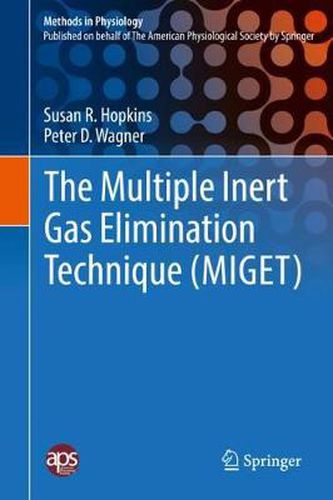Readings Newsletter
Become a Readings Member to make your shopping experience even easier.
Sign in or sign up for free!
You’re not far away from qualifying for FREE standard shipping within Australia
You’ve qualified for FREE standard shipping within Australia
The cart is loading…






This title is printed to order. This book may have been self-published. If so, we cannot guarantee the quality of the content. In the main most books will have gone through the editing process however some may not. We therefore suggest that you be aware of this before ordering this book. If in doubt check either the author or publisher’s details as we are unable to accept any returns unless they are faulty. Please contact us if you have any questions.
The Multiple Inert Gas Elimination Technique (MIGET) is a complex methodology involving specialized gas chromatography and sophisticated mathematics developed in the early 1970’s. Essentially, nobody possesses knowledge of all its elements except for its original developers, and while some practical and theoretical aspects have been published over the years, none have included the level of detail that would be necessary for a potential user to adopt and understand the technique easily. This book is unique in providing a highly detailed, comprehensive technical description of the theory and practice underlying the MIGET to help potential users set up the method and solve problems they may encounter.
But it is much more than a reference manual - it is a substantial physiological and mathematical treatise in its own right.
It also has a wide applicability - there is extensive discussion of the common biological problem of quantitative inference. The authors
took measured whole-lung gas exchange variables, and used mathematical procedures to infer the distribution of ventilation and blood flow from this data. In so doing, they developed novel approaches to answer the question: What are the limits to what can be concluded when inferring the inner workings from the black box behavior of a system? The book details the approaches developed, which can be generalized to other similar distributed functions within tissues and organs. They involve engineering approaches such as linear and quadratic programming, and uniquely use mathematical tools with biological constraints to obtain as much information as possible about a black box system.
Lastly, the book summarizes the hundreds of research papers published by a number of groups over the decades in a way never before attempted in order to marshal the world’s literature on the topic and to provide in one place the wealth of important discoveries, both physiological a
nd clinical, enabled by the technique.
$9.00 standard shipping within Australia
FREE standard shipping within Australia for orders over $100.00
Express & International shipping calculated at checkout
This title is printed to order. This book may have been self-published. If so, we cannot guarantee the quality of the content. In the main most books will have gone through the editing process however some may not. We therefore suggest that you be aware of this before ordering this book. If in doubt check either the author or publisher’s details as we are unable to accept any returns unless they are faulty. Please contact us if you have any questions.
The Multiple Inert Gas Elimination Technique (MIGET) is a complex methodology involving specialized gas chromatography and sophisticated mathematics developed in the early 1970’s. Essentially, nobody possesses knowledge of all its elements except for its original developers, and while some practical and theoretical aspects have been published over the years, none have included the level of detail that would be necessary for a potential user to adopt and understand the technique easily. This book is unique in providing a highly detailed, comprehensive technical description of the theory and practice underlying the MIGET to help potential users set up the method and solve problems they may encounter.
But it is much more than a reference manual - it is a substantial physiological and mathematical treatise in its own right.
It also has a wide applicability - there is extensive discussion of the common biological problem of quantitative inference. The authors
took measured whole-lung gas exchange variables, and used mathematical procedures to infer the distribution of ventilation and blood flow from this data. In so doing, they developed novel approaches to answer the question: What are the limits to what can be concluded when inferring the inner workings from the black box behavior of a system? The book details the approaches developed, which can be generalized to other similar distributed functions within tissues and organs. They involve engineering approaches such as linear and quadratic programming, and uniquely use mathematical tools with biological constraints to obtain as much information as possible about a black box system.
Lastly, the book summarizes the hundreds of research papers published by a number of groups over the decades in a way never before attempted in order to marshal the world’s literature on the topic and to provide in one place the wealth of important discoveries, both physiological a
nd clinical, enabled by the technique.